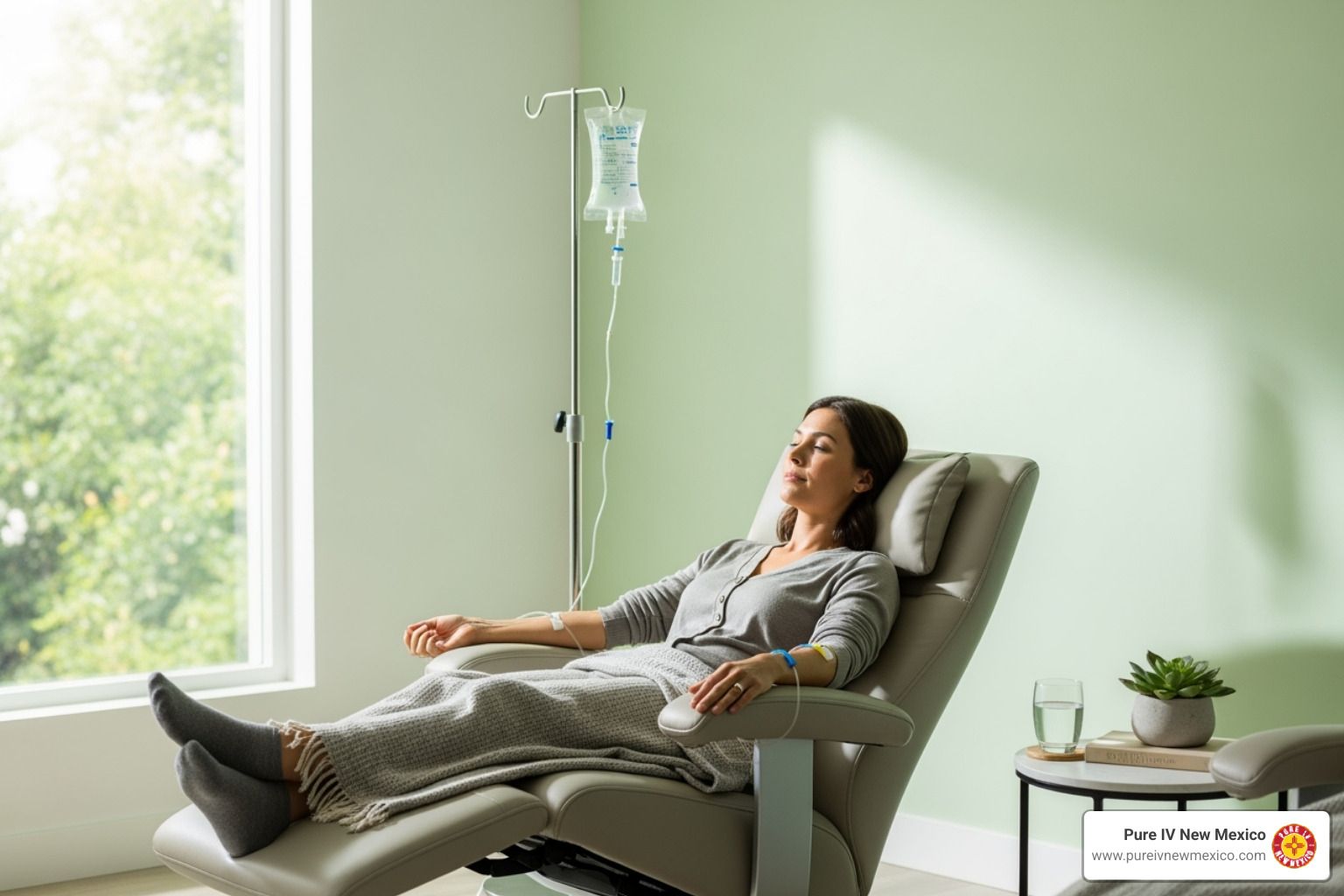Common Reasons for Dehydration and How to Prevent Them

Medically reviewed by Micaela Strevay, FNP-C, PMHNP-BC
Table of Contents
Dehydration happens when your body loses more fluids than it takes in. Fluids carry electrolytes like sodium and potassium that keep muscles, nerves, and organs working. Without adequate hydration, the body cannot regulate temperature, maintain blood pressure, or support vital organ function.
Many people think dehydration only comes from not drinking enough water. In reality, there are many other reasons your body may become dehydrated. Knowing these causes helps you prevent problems and stay healthy.
Reasons for Dehydration
Inadequate Fluid Intake
One of the simplest yet most common causes of dehydration is not drinking enough fluids. This may occur because of:
- Neglect or forgetfulness: Busy schedules or low awareness can cause people to skip drinking water regularly.
- Reduced thirst sensation: Especially during colder seasons.
- Limited access to fluids: Certain situations, such as travel or illness, may restrict fluid availability.
- Avoidance due to illness: People experiencing sore throats, mouth sores, or nausea may avoid drinking liquids, worsening dehydration risk.
Over time, inadequate fluid intake prevents the body from maintaining proper body fluid and electrolyte balance, leading to fatigue, muscle spasms, weakness, and other symptoms.
Increased Fluid Loss
Beyond insufficient intake, rapid fluid loss leads to dehydration. Common causes include:
- Vomiting and diarrhea: Particularly in infections such as stomach bugs and food poisoning, these cause massive loss of water and electrolytes. Children and infants are especially vulnerable due to their smaller fluid reserves.
- Excessive sweating: Hot weather, fever, or strenuous exercise increases sweating. This removes substantial body water and salts, causing electrolyte imbalances.
- Fever: Fever raises body temperature, which increases water loss through the skin.
- Frequent urination: Conditions like uncontrolled diabetes increase urine output, while certain medications like diuretics promote fluid excretion, leading to further dehydration.
- Burns: Damage to skin integrity leads to fluid leakage and increased insensible fluid loss.
When fluid loss becomes excessive, oral hydration may not be enough, and professional support like IV hydration therapy may be required.
Underlying Medical Conditions
Several health conditions increase susceptibility to dehydration by either increasing fluid loss or impairing fluid retention:
- Diabetes: High blood sugar causes osmotic diuresis (excessive urination) that depletes fluids.
- Kidney failure: Reduces the ability to balance fluids and electrolyte levels.
- Endocrine disorders: Conditions such as adrenal insufficiency (Addison’s disease) and diabetes insipidus cause excessive water loss.
- Gastrointestinal disorders: Chronic illnesses like Crohn’s disease and celiac disease cause malabsorption and diarrhea, leading to fluid loss.
- Medications: Diuretics, laxatives, and certain blood pressure drugs increase fluid excretion.
These conditions increase the importance of monitoring hydration closely, as dehydration can worsen their symptoms and slow recovery.
Lifestyle Factors
Daily habits and lifestyle choices can promote dehydration:
- Alcohol consumption: Alcohol is a diuretic, increasing urine production and fluid loss.
- Poor diet: Diets low in water-rich foods or high in salt can impact hydration.
- Excessive caffeine: Caffeine has mild diuretic effects that can contribute to fluid depletion if not balanced by adequate water intake.
- Excessive exercise: High-intensity workouts without planned hydration leave the body struggling to recover lost fluids.
Lifestyle-related dehydration is preventable, but it requires awareness and small daily adjustments.
Age-Related Factors
Young children and older adults face higher risks of dehydration. Children lose fluids more quickly because of their smaller size and faster metabolism. They also rely on adults to recognize their needs and provide fluids.
Older adults often experience reduced thirst, making them less likely to drink even when their bodies need water.
In addition, age-related changes in kidney function reduce the ability to conserve fluids. These factors make both age groups more vulnerable, especially during illness or hot weather.
Environmental Factors
The environment plays a major role in hydration status. Hot and humid conditions increase sweating, and when sweat cannot evaporate effectively, water loss rises further.
In high-altitude areas, the body loses more fluid through breathing, while air travel or air-conditioned spaces dry out the skin and mucous membranes.
People exposed to extreme environments, whether through work, travel, or recreation, must increase their fluid intake and, when needed, use electrolyte replacement solutions to stay hydrated.
Signs and Symptoms of Dehydration
Early signs and symptoms of dehydration are easy to miss. Watch for:
- Constant thirst and dry mouth.
- Your urine color gets darker, or you experience reduced urine output.
- Fatigue, dizziness, or lightheadedness.
- Headaches, confusion, brain fog, and muscle cramps may occur in severe cases.
Recognizing these signs early allows quick action before dehydration becomes dangerous.
How to Prevent Dehydration

Preventing dehydration is easier than treating it after it sets in. The key is balancing daily fluid intake with the body’s fluid losses while also addressing unique personal and environmental factors.
Simple changes in habits, diet, and awareness significantly reduce the risk of dehydration.
- Maintain adequate fluid intake: Your body depends on steady hydration throughout the day. Most adults need 8–10 cups of water daily, though exact needs vary with age, body weight, and activity level. Rather than drinking large amounts at once, sip water consistently. Fruit juices also count towards it. Carrying a reusable water bottle is an easy way to stay on track.
- Include electrolyte solutions and drinks: Water alone is not always enough, especially after illness, exercise, or hot weather. Electrolyte drinks and oral rehydration solutions help replace lost potassium, calcium, magnesium, and sodium salts. This keeps nerves, muscles, and circulation functioning properly. For athletes or those working outdoors, electrolyte replacement should be part of the daily routine.
- Eat hydrating foods: Fruits and vegetables are natural sources of both fluids and electrolytes, as they have high water content. Watermelon, oranges, cucumbers, and celery are especially effective at supporting hydration. Soups and broths also count toward fluid intake, making them excellent choices during recovery from illness.
- Adjust for environment: Hot, humid climates and high altitudes demand higher fluid intake. In these conditions, fluid loss happens faster through sweat or breathing. Travelers should plan by packing water and electrolyte packs. Even in air-conditioned or heated indoor environments, dry air can increase fluid needs.
- Balance lifestyle choices: Caffeine and alcohol both increase urine output, raising the risk of fluid loss. While they don’t need to be avoided completely, balance them with extra water. During exercise, drink before, during, and after activity. For high-intensity workouts, choose sports drinks or hydration formulas designed for athletes.
- Monitor vulnerable populations: Children and older people require closer hydration monitoring. Kids lose fluids quickly through play and illness, while older adults often don’t feel thirsty until dehydration has already started. People with chronic conditions like diabetes or kidney disease should follow medical guidance to maintain safe hydration levels, since fluid management is often more complex.
- Monitor early warning signs: Prevention also means acting early. Dry mouth, dark urine, dizziness, or rapid heart rate are warning signs that fluid levels are dropping. Addressing these symptoms quickly with water or oral rehydration solutions prevents mild dehydration from progressing into something more serious.
Sometimes, normal water intake, energy drinks, and electrolyte drinks are not enough, especially after illness, food poisoning, or severe fluid losses. Intravenous fluid therapy delivers IV fluids, electrolytes, and vitamins directly into the bloodstream. This bypasses the digestive system, making it faster and more effective than oral rehydration therapy.
Stay Hydrated With IV Hydration Therapy

Dehydration can creep up quickly and affect your energy, focus, and overall well-being. While prevention is important, sometimes your body needs more than water to restore balance. That’s where Pure IV New Mexico comes in.
With our mobile IV hydration services, you get:
- Convenience: Treatment delivered to your home, office, or hotel at a time that works for you.
- Personalized care: Every IV drip is tailored to your specific needs, whether for recovery, energy, or wellness.
- Rapid results: With fluid therapy, fluids, electrolytes, and vitamins go directly into your bloodstream for faster absorption.
- Professional expertise: Treatments are administered by licensed medical professionals, ensuring your safety and comfort.
- Wellness support: Beyond rehydration, IV therapy boosts immunity, restores energy, and supports long-term health.
At Pure IV New Mexico, our goal is simple: to help you feel your best, faster. Whether you’re recovering from dehydration, hangover, heat stroke, or heat exhaustion, preparing for a demanding week, or just maintaining balance, we provide the support your body needs.
Book your IV hydration therapy today and stay one step ahead of dehydration.



